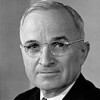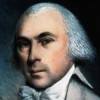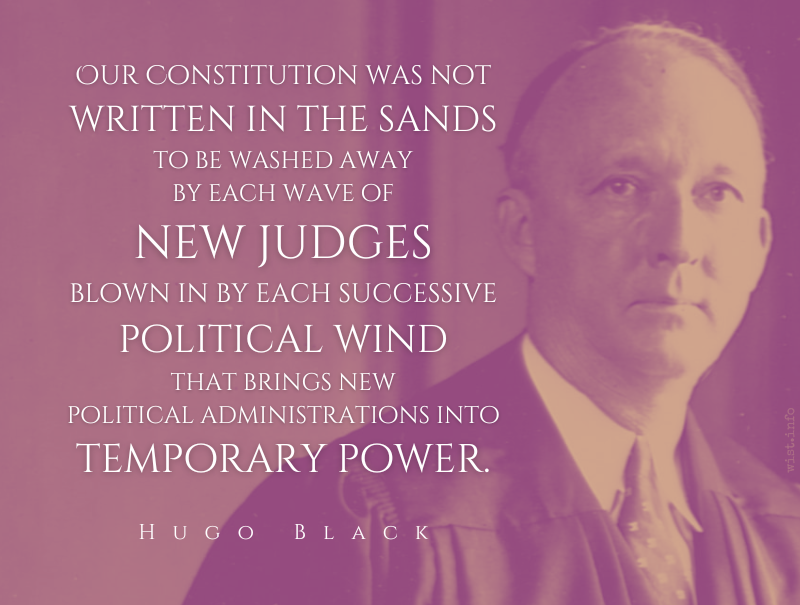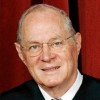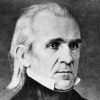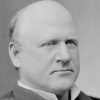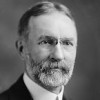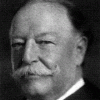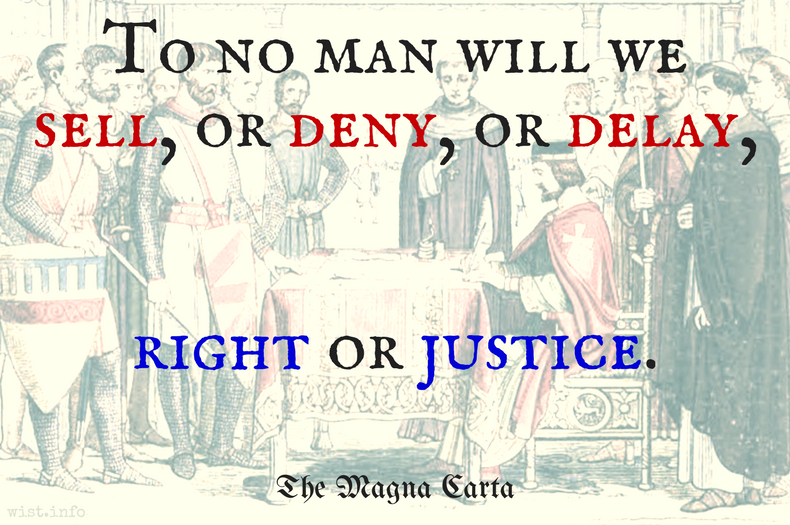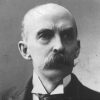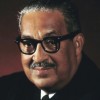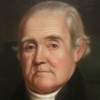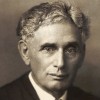Experience has clearly shown that the existing process of law cannot overcome systematic and ingenious discrimination. No law that we now have on the books — and I have helped to put three of them there — can ensure the right to vote when local officials are determined to deny it.
In such a case our duty must be clear to all of us. The Constitution says that no person shall be kept from voting because of his race or his color. We have all sworn an oath before God to support and to defend that Constitution. We must now act in obedience to that oath.Lyndon B. Johnson (1908-1973) American politician, educator, US President (1963-69)
Speech (1965-03-15), “The American Promise,” Joint Session of Congress [14:20]
(Source)
Quotations about:
Constitution
Note not all quotations have been tagged, so Search may find additional quotes on this topic.
The Constitution and the Declaration of Independence can live only as long as they are enshrined in our hearts and minds. If they are not so enshrined, they would be no better than mummies in their glass cases, and they could in time become idols whose worship would be a grim mockery of the true faith. Only as these documents are reflected in the thoughts and acts of Americans can they remain symbols of a power that can move the world.
The civil rights of none shall be abridged on account of religious belief or worship, nor shall any national religion be established, nor shall the full and equal rights of conscience be in any manner, or on any pretext, infringed.
The people shall not be deprived or abridged of their right to speak, to write, or to publish their sentiments; and the freedom of the press, as one of the great bulwarks of liberty, shall be inviolable.
The people shall not be restrained from peaceably assembling and consulting for their common good; nor from applying to the Legislature by petitions, or remonstrances, for redress of their grievances.
James Madison (1751-1836) American statesman, political theorist, US President (1809-17)
Speech Introducing Proposed Constitutional Amendments (1789-06-08)
(Source)
Speech before the House of Representatives, proposing a Bill of Rights amending the US Constitution. This was the first draft of the text that would go on to become the First Amendment.
The First Amendment is truly the heart of the Bill of Rights. The Framers balanced its freedoms of religion, speech, press, assembly and petition against the needs of a powerful central government, and decided that in those freedoms lies this nation’s only true security. They were not afraid for men to be free. We should not be.
Hugo Black (1886-1971) American politician and jurist, US Supreme Court Justice (1937-71)
James Madison Lecture, NYU School of Law (1960-02-17)
(Source)
The inaugural Madison lecture. Reprinted as "The Bill of Rights," NYU Law Review, Vol. 35 (1960-04).
Our Constitution relies on our electorate’s complete ideological freedom to nourish independent and responsible intelligence and preserve our democracy from that submissiveness, timidity and herd-mindedness of the masses which would foster a tyranny of mediocrity.
Robert H. Jackson (1892-1954) US Supreme Court Justice (1941-54), lawyer, jurist, politician
American Communications Assn. v. Douds, 339 U.S. 382, 442 (1950) [concurrence and dissent]
(Source)
Our Constitution was not written in the sands to be washed away by each wave of new judges blown in by each successive political wind that brings new political administrations into temporary power.
Hugo Black (1886-1971) American politician and jurist, US Supreme Court Justice (1937-71)
Turner v. United States, 396 U.S. 398, 426 (1970) [dissenting]
(Source)
The Bill of Rights was not written into the Constitution in order to protect governments from “trouble,” but so that the people might have a legitimate method of causing trouble to governments they no longer trusted.
Henry Steele Commager (1902-1998) American historian, writer, activist
Letter to the Editor, New York Times (17 Jun 1971)
(Source)
I am certainly not an advocate for frequent & untried changes in laws and constitutions. I think moderate imperfections had better be borne with; because when once known, we accommodate ourselves to them, and find practical means of correcting their ill effects. but I know also that laws and institutions must go hand in hand with the progress of the human mind. as that becomes more developed, more enlightened, as new discoveries are made, new truths disclosed, and manners and opinions change with the change of circumstances, institutions must advance also, and keep pace with the times. we might as well require a man to wear still the coat which fitted him when a boy, as civilised society to remain ever under the regimen of their barbarous ancestors.
Thomas Jefferson (1743-1826) American political philosopher, polymath, statesman, US President (1801-09)
Letter (1816-07-12) to “Henry Tompkinson” (Samuel Kercheval)
(Source)
Inscribed (elided) on southeast side of the Jefferson Memorial:
I am not an advocate for frequent changes in laws and constitutions, but laws and institutions must go hand in hand with the progress of the human mind. As that becomes more developed, more enlightened, as new discoveries are made, new truths discovered and manners and opinions change, with the change of circumstances, institutions must advance also to keep pace with the times. We might as well require a man to wear still the coat which fitted him when a boy as a civilized society to remain ever under the regimen of their barbarous ancestors.
Our law affords constitutional protection to personal decisions relating to marriage, procreation, contraception, family relationships, child rearing, and education. Our cases recognize “the right of the individual, married or single, to be free from unwarranted governmental intrusion into matters so fundamentally affecting a person as the decision whether to bear or beget a child.” Our precedents “have respected the private realm of family life which the state cannot enter.” These matters, involving the most intimate and personal choices a person may make in a lifetime, choices central to personal dignity and autonomy, are central to the liberty protected by the Fourteenth Amendment. At the heart of liberty is the right to define one’s own concept of existence, of meaning, of the universe, and of the mystery of human life. Beliefs about these matters could not define the attributes of personhood were they formed under compulsion of the State.
Anthony Kennedy (b. 1936) US Supreme Court Justice
Planned Parenthood v. Casey (91-744), 505 U.S. 833 (29 Jun 1992) [Majority Opinion]
(Source)
Citations removed.
By the theory of our Government majorities rule, but this right is not an arbitrary or unlimited one. It is a right to be exercised in subordination to the Constitution and in conformity to it. One great object of the Constitution was to restrain majorities from oppressing minorities or encroaching upon their just rights. Minorities have a right to appeal to the Constitution as a shield against such oppression.
James K. Polk (1795-1849) American lawyer, politician, US President (1845-1849)
Inaugural Address (4 Mar 1845)
(Source)
I can hardly believe that any person can be found who will not admit that every one of these provisions is just. They are all asserted, in some form or other, in our Declaration or organic law. But the Constitution limits only the action of Congress, and is not a limitation on the States. This amendment supplies that defect, and allows Congress to correct the unjust legislation of the States, so far that the law which operates upon one man shall operate equally upon all. Whatever law punishes a white man for a crime shall punish the black man precisely in the same way and to the same degree. Whatever law protects the white man shall afford equal protection to the black man. Whatever means of redress is afforded to one shall be afforded to all. Whatever law allows the white man to testify in court shall allow the man of color to do the same. These are great advantages over their present codes.
James A. Garfield (1831-1881) US President (1881), lawyer, lay preacher, educator
Speech, House of Representatives (4 Apr 1871)
(Source)
On the proposed 14th Amendment to the US Constitution, which forbade to each state the ability to "deny to any person within its jurisdiction the equal protection of the laws."
I told him that, thank God, under our constitution there was no connection between Church and State, and that in my action as President of the U.S. I recognized no distinction of creeds in my appointments to office.
James K. Polk (1795-1849) American lawyer, politician, US President (1845-1849)
Diary (1846-10-14 )
(Source)
But in view of the Constitution, in the eye of the law, there is in this country no superior, dominant, ruling class of citizens. There is no caste here. Our Constitution is color-blind, and neither knows nor tolerates classes among citizens. In respect of civil rights, all citizens are equal before the law. The humblest is the peer of the most powerful. The law regards man as man, and takes no account of his surroundings or of his color when his civil rights as guaranteed by the supreme law of the land are involved.
John Marshall Harlan (1833-1911) American lawyer, politician, Supreme Court Justice (1877-1911)
Plessy v. Ferguson 163 U.S. 537, 559 (1896) [dissent]
(Source)
Arbitrary power and the rule of the Constitution cannot both exist. They are antagonistic and incompatible forces; and one or the other must of necessity perish whenever they are brought in conflict.
George Sutherland (1862-1942) Anglo-American jurist, Supreme Court Justice (1922-1938)
Jones v. Securities & Exchange Commission 298 U.S. 1 (1936) [majority opinion]
(Source)
No honest, clear-headed man, however great a lover of popular government, can deny that the unbridled expression of the majority of a community converted hastily into law or action would sometimes make a government tyrannical and cruel. Constitutions are checks upon the hasty action of the majority. They are the self-imposed restraints of a whole people upon a majority of them to secure sober action and a respect for the rights of the minority.
William Howard Taft (1857-1930) US President (1909-13) and Chief Justice (1921-1930)
Veto Statement for the Arizona Enabling Act (15 Aug 1911)
(Source)
Taft vetoed the admission of Arizona to the US with a state constitution that allowed popular recall of judges.
To no man will we sell, or deny, or delay, right or justice.
[Nulli vendemus, nulli negabimus, aut differimus rectum aut justiciam.]
In a sense we’ve come to our nation’s capital to cash a check. When the architects of our republic wrote the magnificent words of the Constitution and the Declaration of Independence, they were signing a promissory note to which every American was to fall heir. This note was a promise that all men, yes, black men as well as white men, would be guaranteed the “unalienable Rights” of “Life, Liberty and the pursuit of Happiness.”
It is obvious today that America has defaulted on this promissory note, insofar as her citizens of color are concerned. Instead of honoring this sacred obligation, America has given the Negro people a bad check, a check which has come back marked “insufficient funds.”
But we refuse to believe that the bank of justice is bankrupt. We refuse to believe that there are insufficient funds in the great vaults of opportunity of this nation. And so, we’ve come to cash this check, a check that will give us upon demand the riches of freedom and the security of justice.
Martin Luther King, Jr. (1929-1968) American clergyman, civil rights leader, social activist, preacher
“I Have a Dream,” speech, Washington, DC (1963-08-28)
(Source)
My view was that every executive officer, and above all every executive officer in high position, was a steward of the people bound actively and affirmatively to do all he could for the people, and not to content himself with the negative merit of keeping his talents undamaged in a napkin. I declined to adopt the view that what was imperatively necessary for the Nation could not be done by the President unless he could find some specific authorization to do it. My belief was that it was not only his right but his duty to do anything that the needs of the Nation demanded unless such action was forbidden by the Constitution or by the laws. Under this interpretation of executive power I did and caused to be done many things not previously done by the President and the heads of the departments. I did not usurp power, but I did greatly broaden the use of executive power. In other words, I acted for the public welfare, I acted for the common well-being of all our people, whenever and in whatever manner was necessary, unless prevented by direct constitutional or legislative prohibition.
Every defendant is entitled to a trial in which his interests are vigorously and conscientiously advocated by an able lawyer. A proceeding in which the defendant does not receive meaningful assistance in meeting the forces of the state does not, in my opinion, constitute due process.
Thurgood Marshall (1908-1993) American lawyer, US Supreme Court Justice (1967-1991)
Strickland v. Washington, 466 U.S. 668 (1984) [Dissenting]
(Source)
The American states have gone far in assisting the progress of truth; but they have stopped short of perfection. They ought to have given every honest citizen an equal right to enjoy his religion and an equal title to all civil emoluments, without obliging him to tell his religion. Every interference of the civil power in regulating opinion, is an impious attempt to take the business of the Deity out of his own hands; and every preference given to any religious denomination, is so far slavery and bigotry.
The Bill of Rights was designed trustfully to prohibit forever two of the favorite crimes of all known governments: the seizure of private property without adequate compensation and the invasion of the citizen’s liberty without justifiable cause and due process.
A bill of rights is what the people are entitled to against every government on earth, general or particular, and what no just government should refuse, or rest on inference.
Thomas Jefferson (1743-1826) American political philosopher, polymath, statesman, US President (1801-09)
Letter to James Madison (20 Dec 1787)
(Source)
The aim of every political constitution is, or ought to be, first to obtain for rulers men who possess most wisdom to discern, and most virtue to pursue, the common good of the society; and in the next place, to take the most effectual precautions for keeping them virtuous whilst they continue to hold their public trust.
Stare decisis is usually the wise policy, because in most matters it is more important that the applicable rule of law be settled than that it be settled right. … This is commonly true even where the error is a matter of serious concern, provided correction can be had by legislation. But in cases involving the Federal Constitution, where correction through legislative action is practically impossible, this court has often overruled its earlier decisions. The court bows to the lessons of experience and the force of better reasoning, recognizing that the process of trial and error, so fruitful in the physical sciences, is appropriate also in the judicial function.
Some men look at Constitutions with sanctimonious reverence, & deem them, like the ark of the covenant, too sacred to be touched. they ascribe to the men of the preceding age a wisdom more than human, and suppose what they did to be beyond amendment. I knew that age well: I belonged to it, and labored with it. it deserved well of it’s country. it was very like the present, but without the experience of the present: and 40. years of experience in government is worth a century of book-reading: and this they would say themselves, were they to rise from the dead.
Thomas Jefferson (1743-1826) American political philosopher, polymath, statesman, US President (1801-09)
Letter (1816-07-12) to “Henry Tompkinson” (Samuel Kercheval)
(Source)
Do the people of this land — in the providence of God, favored, as they sometimes boast, above all others in the plenitude of their liberties — desire to preserve those so carefully protected by the First Amendment: liberty of religious worship, freedom of speech and of the press, and the right as freemen peaceably to assemble and petition their government for a redress of grievances? If so, let them withstand all beginnings of encroachment. For the saddest epitaph which can be carved in memory of a vanished liberty is that it was lost because its possessors failed to stretch forth a saving hand while yet there was time.
Our new Constitution is now established, and has an appearance that promises permanency, but in this world nothing can be said to be certain, except death and taxes.
We who hold public office are enjoined by our Constitution against enacting laws to tell the people when or where or how to pray.
All our experience and all our knowledge proves that injunction is good. for, if government could ordain the people’s prayers, government could also ordain its own worship — and that must never be.
The separation of church and state has served our freedom well because men of state have not separated themselves from church and faith and prayer.Lyndon B. Johnson (1908-1973) American politician, educator, US President (1963-69)
Speech (1964-02-05), Presidential Prayer Breakfast, Washington, D.C.
(Source)
This was at the 12th Annual Presidential Prayer Breakfast.
In the Proceedings of the Illinois State AFL-CIO Convention (1968), there is (a) a reference to a note that the state president of the AFL/CIO, Reuben G. Soderstrom, attending the 16th such Prayer Breakfast, and then (b) a passage on the next page "U. S. President Lyndon B. Johnson's statement to a tremendous audience contained the following comment:"
Our Constitution separates church and state. We know that separation is a source of our system's strength, but the conscience of our nation does not call for separation between men of state and faith in the Supreme Being.
Johnson does not appear to have included this text in his speech at the 16th Presidential Prayer Breakfast, nor does he appear to have gone to the 1968 Illinois AFL/CIO convention. Is this an odd paraphrase of the comments from four years earlier? Did Johnson speak the above in another venue that was also quoted in the Illinois AFL/CIO Convention proceedings? Is this paraphrase actually what he said in 1964, regardless of the written record of his comments?
While that shorter quote, or further paraphrases of it, are easy to find in quotation collections online, I can find no citation associated with it.
We should stop going around babbling about how we’re the greatest democracy on earth, when we’re not even a democracy. We are a sort of militarised republic. The founding fathers hated two things, one was monarchy and the other was democracy, they gave us a constitution that saw to it we will have neither. I don’t know how wise they were.
Gore Vidal (1925-2012) American novelist, dramatist, critic
“Gore Vidal and the Mind of the Terrorist”, interview by Ramona Koval, Australian Broadcasting Corporation (Nov 2001)
(Source)
It is my belief that there are “absolutes” in our Bill of Rights, and that they were put there on purpose by men who knew what the words meant and meant their prohibitions to be “absolutes.”
Hugo Black (1886-1971) American politician and jurist, US Supreme Court Justice (1937-71)
James Madison Lecture, NYU School of Law (1960-02-17)
(Source)
The inaugural Madison lecture. Reprinted as "The Bill of Rights," NYU Law Review, Vol. 35 (1960-04).
I prefer a man who will burn the flag and then wrap himself in the Constitution to a man who will burn the Constitution and then wrap himself in the flag.
Molly Ivins (1944-2007) American writer, political columnist [Mary Tyler Ivins]
(Misattributed)
(Source)
While this appeared in her regular syndicated column (29 Jun 1997), Ivins was actually quoting a comment previously made by Texas state representative Craig Washington on the floor of the Texas Senate. It is frequently misattributed to Ivins herself.
Variant: "I prefer someone who burns the flag and then wraps themselves up in the Constitution over someone who burns the Constitution and then wraps themselves up in the flag."
The First Amendment has erected a wall between church and state. That wall must be kept high and impregnable. We could not approve the slightest breach.
Hugo Black (1886-1971) American politician and jurist, US Supreme Court Justice (1937-71)
Everson v. Board of Education, 330 U.S. 1, 18 (1947) [majority opinion]
(Source)
The makers of our Constitution undertook to secure conditions favorable to the pursuit of happiness. They recognized the significance of man’s spiritual nature, of his feelings and of his intellect. They knew that only a part of the pain, pleasure and satisfactions of life are to be found in material things. They sought to protect Americans in their beliefs, their thoughts, their emotions and their sensations. They conferred, as against the government, the right to be let alone — the most comprehensive of rights and the right most valued by civilized men.
Louis Brandeis (1856-1941) American lawyer, activist, Supreme Court Justice (1916-39)
Olmstead v. United States, 277 U.S. 438 (1928) [Dissent]
(Source)
It is not to be supposed that the age-old readiness to try to convert minds by pressure or suppression, instead of reason and persuasion, is extinct. Our protection against all kinds of fanatics and extremists, none of whom can be trusted with unlimited power over others, lies not in their forbearance, but in the limitations of our Constitution.
Robert H. Jackson (1892-1954) US Supreme Court Justice (1941-54), lawyer, jurist, politician
American Communications Association v. Douds, 339 U.S. 382, 438-439 (1950) [concurrence and dissent]
(Source)
I know no safe depository of the ultimate powers of the society, but the people themselves: and if we think them not enlightened enough to exercise their controul with a wholsome discretion, the remedy is, not to take it from them, but to inform their discretion by education. this is the true corrective of abuses of constitutional power.
Thomas Jefferson (1743-1826) American political philosopher, polymath, statesman, US President (1801-09)
Letter to William Charles Jarvis (28 Sep 1820)
(Source)
The aim of every political constitution is, or ought to be, first to obtain for rulers men who possess most wisdom to discern, and most virtue to pursue, the common good of the society; and in the next place, to take the most effectual precautions for keeping them virtuous whilst they continue to hold their public trust.
A government of laws, and not of men.
John Adams (1735-1826) American lawyer, Founding Father, statesman, US President (1797-1801)
“Novanglus” #7, Boston Gazette (6 Mar 1775)
Adams credited the line to James Harrington (1611-77), who wrote of "the empire of laws and not of men" (The Commonwealth of Oceana (1656)). Adams later used the term in the Massachusetts Constitution, Bill of Rights, article 30 (1780).
it would be a dangerous delusion were a confidence in the men of our choice to silence our fears for the safety of our rights; that confidence is every where the parent of despotism; free government is founded in jealousy, and not in confidence; it is jealousy, and not confidence, which prescribes limited constitutions to bind down those whom we are obliged to trust with power; that our Constitution has accordingly fixed the limits to which, and no farther, our confidence may go. […] In questions of power, then, let no more be said of confidence in man, but bind him down from mischief by the chains of the Constitution.
Thomas Jefferson (1743-1826) American political philosopher, polymath, statesman, US President (1801-09)
“Kentucky Resolutions,” Resolution 9 (1798)
(Source)
In protest of the Alien and Sedition Acts.
It is contended by many that ours is a Christian government, founded upon the Bible, and that all who look upon the book as false or foolish are destroying the foundation of our country. The truth is, our government is not founded upon the rights of gods, but upon the rights of men. Our Constitution was framed, not to declare and uphold the deity of Christ, but the sacredness of humanity. Ours is the first government made by the people and for the people. It is the only nation with which the gods have had nothing to do. And yet there are some judges dishonest and cowardly enough to solemnly decide that this is a Christian country, and that our free institutions are based upon the infamous laws of Jehovah.
If the First Amendment means anything, it means that a State has no business telling a man, sitting alone in his own house, what books he may read or what films he may watch.
The First Amendment is often inconvenient. But that is beside the point. Inconvenience does not absolve the government of its obligation to tolerate speech.
Anthony Kennedy (b. 1936) US Supreme Court Justice
International Society for Krishna Consciousness v. Lee, 505 U.S. 672 (26 Jun 1992) [concurring[
(Source)
But they think they know it. And their idea is all the same. You can trace it to the same thing, doesn’t make any difference what it is, what their experience is, or why they’re mad with the Court. It’s all because each one of them believes that the Constitution prohibits that which they think should be prohibited, and it permits that which they think should be permitted.
Hugo Black (1886-1971) American politician and jurist, US Supreme Court Justice (1937-71)
Interview with Eric Serverid and Martin Agronsky, CBS News (1968-12-09)
On the public's misunderstanding of the Constitution. Reprinted in "Newsmakers, Objection Overruled," Newsweek (1968-12-09), and in "Justice Black and the Bill of Rights," Southwestern University Law Review (1977).
Black used the same idea on multiple occasions, e.g., at a news conference in Washington, D.C. (1971-02-25):
The layman's Constitutional view is that what he likes is constitutional and that which he doesn't like is unconstitutional. That about measures up the Constitutional acumen of the average person.
But it’s no show just to protect the serious, the solemn, and the high-minded. We must protect the flippant, the zany, the heretical, and the downright queer. The Constitution gives every American the inalienable right to make a damn fool of himself.


